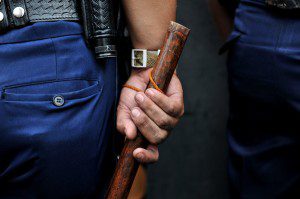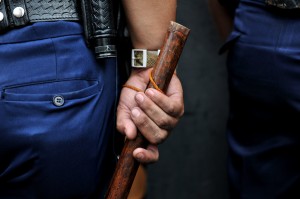Salil Shetty, Secretary General of Amnesty International, blogs from Manila, as we launch new research revealing that in the Philippines, police torture is routine. President Aquino – whose father was an Amnesty International prisoner of conscience in the 1970s and himself a victim of torture – has declared that nobody is above the law. But as Salil reports, in the Philippines the police are indeed above the law.
Manila: the traffic jams are as appalling as ever. But even stuck at a crawl, it’s impossible not to feel buoyed by the vibrancy of the place – positive energy abounds. The Philippines is one of Asia’s fastest growing economies and is set to grow by seven per cent this year. Parliamentary and media debates are worthy of a flourishing democracy, proudly upheld by a people whose courage impressed the world when they stood up to tanks during the 1986 revolution, and peacefully ushered in a democratic era. And in 2009, the country proved itself a true regional leader by passing a landmark Anti-Torture Law, which Amnesty proudly supported and worked on.

The Philippines is featured in our global Stop Torture campaign, and a key focus for the work of Amnesty International.
This week, I sat with Alfreda Disbarro in her jail in Paranaque City, a poor district of Manila, and heard her story. Alfreda was tortured repeatedly when she was arrested last year and to this day, she remains in pain. “That’s exactly what they used on me”, she said sorrowfully, pointing to a photo of a police baton on Amnesty’s report cover.
By going public with her story, Alfreda has shown enormous courage. For in the Philippines, those who accuse the police of torture regularly find themselves exposed to threats and reprisals. As a result, the issue is massively underreported. But despite the fear that silences so many torture survivors, Alfreda felt she had no choice but to speak up. And her story can help lead to change. Afreda has been the focus of massive campaigning by Amnesty International, and she and her family expressed their thanks for what Amnesty has done by highlighting her case.
Change is beginning to happen as we work both with those around the world and within the Philippines to highlight these terrible crimes. The day after I met Koko Pimentel, the chair of the Senate’s justice and human rights committee, he announced a proposed Senate inquiry into the findings in Amnesty’s report. That will be an important start, for sure.
But those most directly in decision-making positions still seem reluctant to face the scale of the problem – let alone act on it. After we met them, the Philippines National Police issued a press release which suggested that we were largely congratulating them for their “best practices” (of torture?).
Pope Francis will be making his first papal visit to the Philippines in January – an event which is already filling the news pages and will be accompanied by a week’s holiday in his honour. Earlier this year, the Pope condemned torture in the strongest terms as “a mortal sin, a very serious sin”. On behalf of Alfreda, and countless others who deserve justice, I hope the Philippines government is listening.
Help us #StopTorture in the Philippines by ensuring that no one is above the law, not even the police. President Aquino must make sure that torturers are brought to justice. Take action here.


